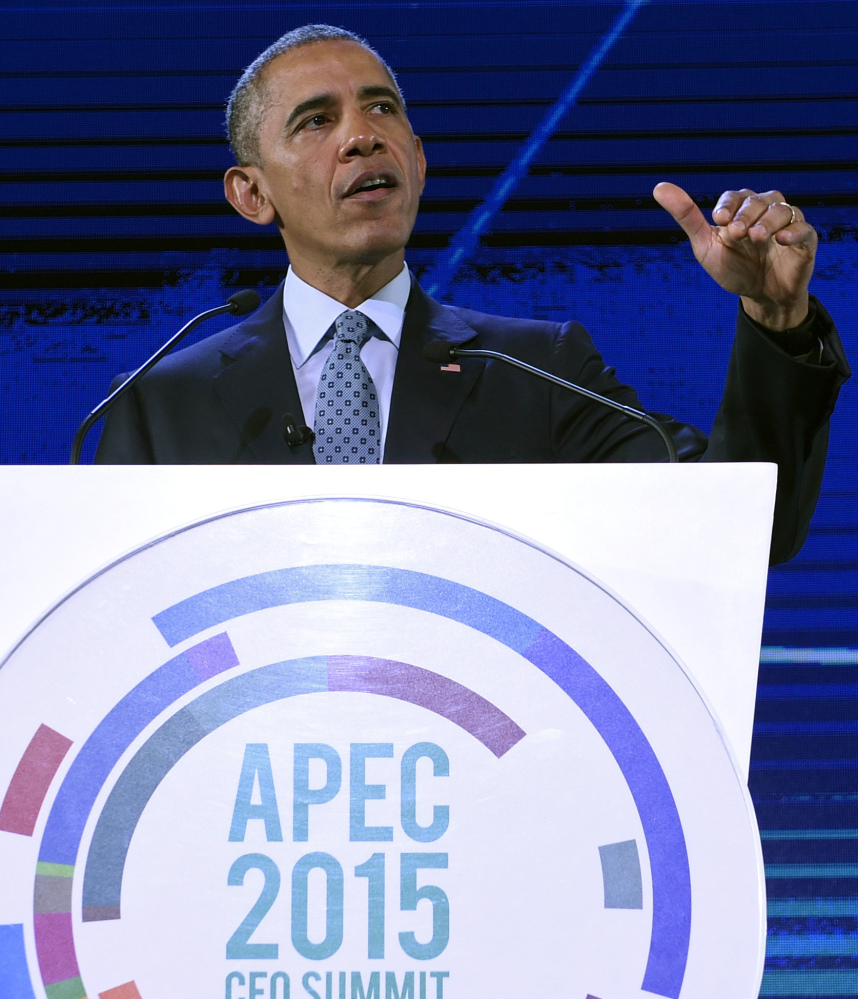MANILA, Philippines — When President Obama gathered his partners in a new trade deal to celebrate finalizing the massive accord, the group posed for a photo, shook hands and got back to work.
Such is the nature of Obama’s trade tour through Asia this week. Even as he marks a major milestone on the world stage, Obama is looking at a tough fight over ratification at home. No one is popping champagne corks.
“Execution is critical,” Obama told the 11 other Pacific Rim leaders on Wednesday as they met for the first time since completing the Trans-Pacific Partnership. Obama urged the group ratify the deal as quickly as possible.
But more than any other nation, the U.S. is likely to drive the pace.
Trade legislation passed last summer prevents Obama from even formally signing the deal until January. Mandated studies and other requirements push the window for a vote squarely into campaign season – or perhaps even after next November’s election.
The president is facing opposition to the deal, the cornerstone of his effort to “rebalance” U.S. foreign and economic policy toward Asia, from Democrats and Republicans alike. Many Democrats, labor groups and the party’s presidential candidates – including Hillary Rodham Clinton – argue the deal will lower wages and includes weak environment and labor standards. Some Republicans have signaled they’re not inclined to hand Obama a major victory in an election year.
“Whether you can get the votes essentially comes down to whether Republicans like trade more than they dislike Obama,” said Daniel Bob, analyst at Sasakawa USA, a think tank that studies U.S.-Japan relations. Bob said concerns expressed by Senate Finance Committee Chairman Orrin Hatch are likely to give some member leaders pause.
“Clearly this is going to reduce some leverage that Obama has; when you have the chairman of the finance committee calling for renegotiation of the agreement, that is a serious problem for the administration,” Bob said.
On Thursday, Obama is slated to meet separately with leaders from two member countries – Canadian Prime Minister Justin Trudeau and Japanese Prime Minster Shinzo Abe – on the sidelines of the Asia Pacific Economic Cooperation summit.
Abe may let Obama take the lead. With major elections next summer, Japan, too, has campaign politics to contend with.
Send questions/comments to the editors.



Success. Please wait for the page to reload. If the page does not reload within 5 seconds, please refresh the page.
Enter your email and password to access comments.
Hi, to comment on stories you must . This profile is in addition to your subscription and website login.
Already have a commenting profile? .
Invalid username/password.
Please check your email to confirm and complete your registration.
Only subscribers are eligible to post comments. Please subscribe or login first for digital access. Here’s why.
Use the form below to reset your password. When you've submitted your account email, we will send an email with a reset code.